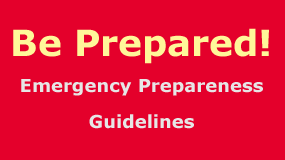 The below information about being prepared for a Disaster is from the Greater New Jersey UMC Conference. It is being posted on this website as a way to share this potentially valuable information with as many people as possible. It is generic information that would apply to many emergency situations.
The below information about being prepared for a Disaster is from the Greater New Jersey UMC Conference. It is being posted on this website as a way to share this potentially valuable information with as many people as possible. It is generic information that would apply to many emergency situations.
Please note: if dangerous weather conditions or other emergency events necessitate that DeBows UMC cancel or reschedule a church related activity, an Alert Notice will be posted on the front page of the church website. We will also update the church voicemail message in such an event.
From the Greater New Jersey UMC Conference:
We have many resources available for disaster response including disaster response coordinators located in each district, more than 300 UMCOR trained early response team members, secure communication technologies and the experience of our A Future With Hope staff who have been on the front lines of recovery operations.
These are two documents that can help you prepare for the next emergency. Please take time to read them and prepare yourselves for any possible impact from future storms.
Hurricane/ Tropical Storms Safety Checklist
Hurricane/ Tropical Storms Survival Guide
It is highly recommended that everyone have a Basic Emergency Supply Kit for any potential disaster, not just hurricanes. According to the Federal Emergency Management Agency (FEMA) these kits, at a minimum, should contain the following:
- Water, one gallon of water per person per day for at least three days, for drinking and sanitation.
- Food, at least a three-day supply of non-perishable food.
- Battery-powered or hand-crank radio and a NOAA Weather Radio with tone alert and extra batteries for both.
- Flashlight and extra batteries.
- First aid kit.
- Whistle to signal for help.
- Dust mask, to help filter contaminated air and plastic sheeting and duct tape to shelter-in-place.
- Moist towelettes, garbage bags and plastic ties for personal sanitation.
- Wrench or pliers to turn off utilities.
- Manual can opener for canned food.
- Local maps.
FEMA also suggests adding these additional items to your basic Emergency Supply Kit:
- Prescription medications (seven day supply) and glasses.
- Infant formula and diapers.
- Pet food and extra water for your pet.
- Important family documents such as copies of insurance policies, identification and bank account records in a waterproof, portable container.
- Cash or traveler’s checks and change.
- Emergency reference material such as a first aid book.
- Sleeping bag or warm blanket for each person. During the cold months, consider additional bedding.
- Household chlorine bleach and medicine dropper—When diluted nine parts water to one part bleach, bleach can be used as a disinfectant. Or in an emergency, you can use it to treat water by using 16 drops of regular household liquid bleach per gallon of water. Do not use scented, color safe or bleaches with added cleaners.
- Fire extinguisher.
- Matches in a waterproof container.
- Feminine supplies and personal hygiene items
- Mess kits, paper cups, plates and plastic utensils, paper towels.
- Paper and pencil.
- Books, games puzzles or other activities for children.

